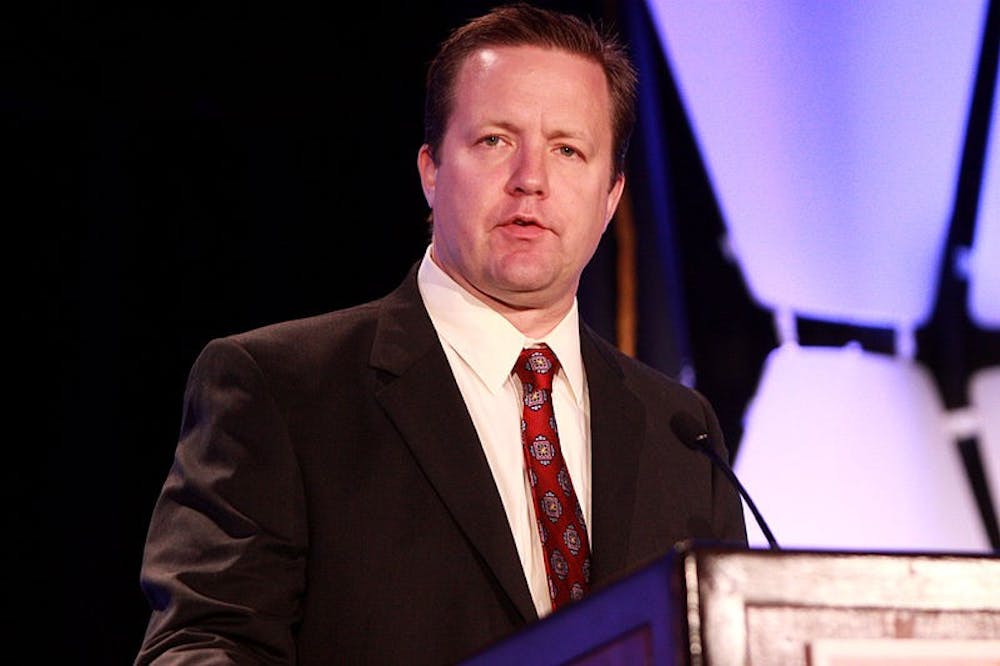Inspirational, a personal hero, and a “real conservative” — those were words used by the current Republican nominee for Senate, Corey Stewart, to describe Paul Nehlen, an openly anti-Semitic candidate running for Wisconsin's 1st congressional district. Banned from Twitter for a racist tweet pointed at American actress Meghan Markle, the Duchess of Sussex, Paul Nehlen boasts a bigoted history. Not only has Nehlen appeared on former KKK Grand Wizard David Duke's podcast and a white power podcast known as “Fash the Nation,” Nehlen has also professed “Jews control the media,” told a Jewish magazine editor to “eat a bullet” and retweeted racist images uploaded by neo-Nazis such as Mark Collet and Jason Kessler — including an image praising last summer’s “Unite the Right” rally in Charlottesville. Such actions are not inspirational, nor are they the actions of a hero or the actions of a real conservative, except to Corey Stewart, who takes a step further by likening himself to Nehlen. Stewart’s association with Paul Nehlen, among several others, is more than abhorred.
Thus, College Republicans at U.Va. were faced with a U.S. Senate candidate who believes real conservatism involves white nationalism and anti-Semitism. As if praising Paul Nehlen wasn’t enough, Corey Stewart perfectly demonstrated his true beliefs when appearing with Jason Kessler at a rally for his organization, Unity & Security for America. As a conservative and a supporter of the non-endorsement statement, I found it of paramount importance to share my personal views in response to a recent op-ed criticizing the decision of College Republicans, which claimed the non-endorsement is an example of Republicans “putting their feelings for the candidate before the betterment of the Virginia Republican Party and the national GOP as a whole.”
To state the non-endorsement “only harms the Republican Party in the November election” misplaces the blame. True harm in November is the fault of Corey Stewart alone, as he does not represent mainstream conservative interests. Corey Stewart has continually attacked the Republican Party, explaining during the 2018 U.S. Senate Republican primary debate held at the Batten School, “before we can take back our country, we have to take back our party, and that means removing those who have betrayed us, namely Mitch McConnell.” Division in the party is not the fault of non-endorsements either, as Stewart was never interested in unification until very recently. After all, the first words he spoke during the same debate were, “I’m not running to unify the GOP.” If Corey Stewart never wanted the full support of Republicans as a candidate, or even trusted the party, why would he need their endorsements now?
Regardless, a Stewart victory would not be in the best interest of the party — it would only detract from its integrity. Conservatism has no interest in devaluing American citizens based on the color of their skin or the ethnicity of their ancestors. Rather, conservatism holds that a moral order exists, and bigotry breaks this order. Therefore, it’s no surprise numerous conservatives want nothing to do with Corey Stewart or his “personal hero”, the fanatic Paul Nehlen, for conservatism has nothing to do with them. Continually associating the Republican Party with hate of any kind only further gives off the false impression that bigotry and conservatism are compatible. Such associations only tear the Republican Party down, and make it easier for the opponents of other Republican officials to win — conservative officials with drastically different views than that of Stewart.
Ultimately, conservatism is defined by what the influential conservative thinker Russell Kirk defines as prudence. Any action must be judged by the consequences it will incur long into the future, and such actions should not be based on short-term gain or advantage. Thus, a win for Corey Stewart is not a true win for conservatism — the ultimate reason I support the non-endorsement statement. While Stewart may share conservative views on several issues, and Republicans would gain another Senate seat this cycle, the total cost, namely the future moral cost, would simply be too high. Sacrificing one’s conscience should never be the price conservatives are willing to pay for victory. Conservatism is not about winning for the sake of simply winning, especially when its moral foundation is at stake.
Instead, holding Corey Stewart and Paul Nehlen accountable to their words and deeds is what conservatism is truly about. President Ronald Reagan echoed this sentiment, explaining, “We must never remain silent in the face of bigotry. We must condemn those who seek to divide us. In all quarters and at all times, we must teach tolerance and denounce racism, anti-Semitism and all ethnic or religious bigotry wherever they exist as unacceptable evils.” Refusing to endorse anyone who flirts with anti-Semitic or bigoted ideals is real conservatism, which is exactly why College Republicans at U.Va. was justified in refusing to endorse Corey Stewart. Conservatives across the Commonwealth should not be afraid to do what is right.
Matthew Nalls is an Opinion Columnist for The Cavalier Daily. He also serves as the director of communications and media for the College Republicans at U.Va., however, the views published here are his own and do not represent those of the organization.







